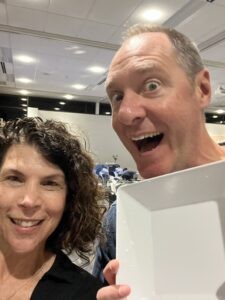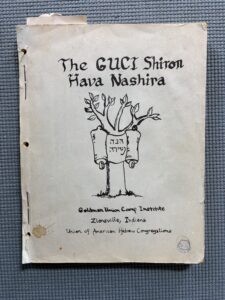On June 13th, I went to Shabbat services. I heard the prayers I needed—sort of.
Israel was at war, striking Iran’s military leaders and nuclear capabilities. And while I was deeply concerned for my friends and family in Israel, I was also afraid of the antisemitic hate growing here in the United States.
I knew what I needed: a good Hashkiveinu. The prayer asks God for a shelter of peace—a thin one, more like a sukkah than a bomb shelter. Still, night after night, I go to bed needing to hear Hashkiveinu before sleep, praying that God will grant my family, my community, and me shelter, safety, and peace.
I have a list of versions I turn to. Central Synagogue’s recording from the pandemic is beautiful. There’s also a summer camp mashup with Hashkiveinu and “Little Talks” that makes no liturgical sense, but it works musically. But the one I return to most—and the one I share with non-Jewish friends who are also scared and ask how I calm myself before bed—is Dan Nichols’s version.
Dan and I went to URJ Goldman Union Camp together
GUCI, that hopeful, forward-looking, liberal Zionist Reform movement camp shaped both of our Jewish identities. Now, as an adult with the life experience, joys, and heartbreaks that come with growing older, Dan’s music speaks to both who I am today and who I was back then—the kid who found joy, safety, and community at summer camp.
To be clear, I don’t think I’m Dan’s intended audience. He built a career as a song leader in Reform Jewish summer camps and as a guest artist in synagogues across the country. His music bridges the joy of camp with the rhythms of full Jewish adulthood.
When my husband and I were newly married, we looked for a synagogue to join.
He was raised Conservative and wanted us to join his congregation. But it didn’t feel right to me. My mother proudly raised me as a Reform Jew, and my family had always been active in the movement—on synagogue boards, as presidents, and in national leadership.
I assumed that my husband’s love and family would make me feel at home in his congregation. But I was missing two things: one was the deeper level of engagement I was used to, and the other was the gut-level connection—the magic of Jewish identity that I had first found at summer camp. (My husband agreed.)
Ironically, I don’t often find that magic in most Reform synagogues either. But I chose to join Valley because—well, the vibe was right. And our rabbi had been on staff at GUCI when I was a camper. Still, my experience as a married woman with a toddler was very different. I wasn’t a carefree kid anymore. I was responsible for feeding and caring for my family—and for how we connected to Jewish life. There was a learning curve to making the congregation feel like home.

The author and Dan Nichols
Then, one Sunday morning, I stumbled upon a Dan Nichols “concert” for the religious school kids.
While I remembered Dan from camp, I had no idea he was an accomplished musician. He and the kids filled the space with joyful Jewish music. That was the moment I knew I had found the right place to raise my daughter—one that brought the spirit of Jewish summer camp into our everyday lives, while also offering me a more grown-up Jewish experience.
I bought an album and started playing Dan’s music for my toddler as a Jewish soundtrack for our home. Every year, Dan returns to our congregation as an artist-in-residence, leading Shabbat services, offering a Saturday concert for the adults and Sunday morning singalongs for the kids.

The Author’s Song Book from her time at GUCI
When my daughter went to GUCI for the first time at age ten, Dan was there for one magical Shabbat.
Camp and home were musically connected for her. That shared connection—between generations, between memory and the present—let me express to her how Jewish music had shaped my own childhood and teenage years, and how it continues to comfort me now.
My daughter has aged out of camp and may be a counselor sometime in the future. Now, she is entering the world as a young adult. While I cannot go back to the safety or innocence of my time at camp, and my daughter too has moved on, we take moments looking at my printed songbook from camp or her digital version, and if I’m lucky we sing songs we both know-especially Hashkiveinu. In this increasingly unstable world, Jewish music, especially Dan’s, still gives us a way to connect to each other, to feel safe, and find a moment of shelter.
My podcast partner, Melissa, and I were able to interview Dan Nichols.
We talked about his connection to URJ camps as a kid and an adult on our Podcast, The Kibbitz, and I am forever grateful. Please listen to episode four to hear his deep insightful discussion.

















